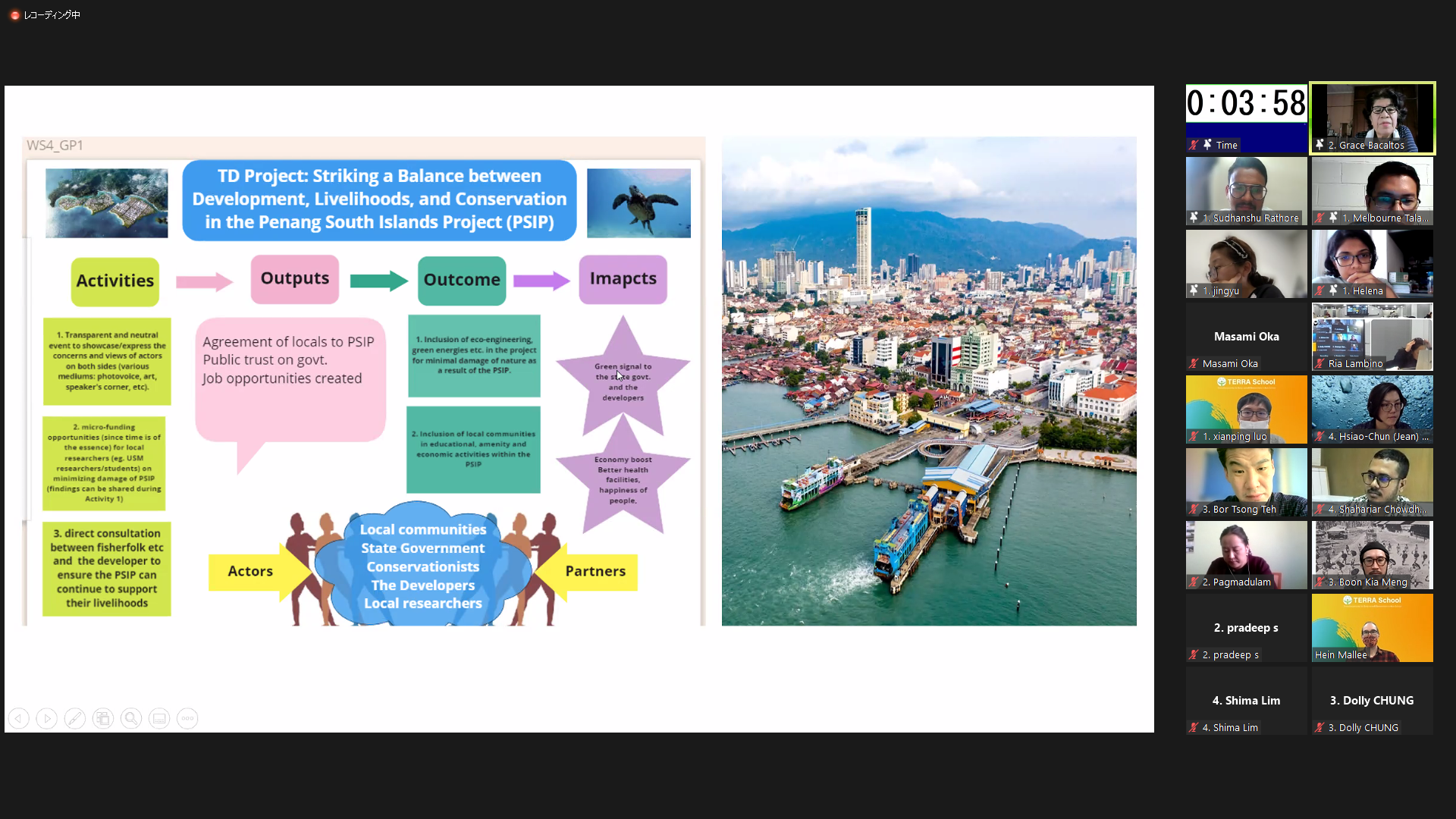Early-career Researchers in Asia Learn Transdisciplinarity
The third “Transdisciplinary for Early Career Researchers in Asia School (TERRA School)” was held from February 16 to March 2, 2022, bringing together 16 participants from eight Asian countries and regions online to learn about the theory and practice of transdisciplinary research (TD). This intensive short course was organized by the Research Institute for Humanity and Nature (RIHN) in collaboration with the Future Earth Global Secretariat Hub Japan.
The training aimed to foster a genuine interest and enthusiasm for TD research and to develop competencies (skills, attitudes, and values) for TD, and featured lectures, case studies, workshops, and a dialogue session with local partners on theories and practice of TD research. Through these activities, participants were expected to learn about transdisciplinary research from both theoretical and applied perspectives.
The lectures provided theoretical background for TD research, and tools and methodologies useful for TD research, specifically on clarifying, diagnosing the problem/s; identifying strategic stakeholders to engage with; looking at shared objects of interest; and developing a theory of change for the TD research. However, the real-world experiences of conducting TD by many RIHN research projects has indicated that the process is nonlinear and often not followed. Therefore, the course incorporated a wealth of case studies: leaders of three transdisciplinary research projects conducted at RIHN shared their thought-provoking experiences and discussed the need for stakeholders engagement in addressing complex issues, the role of researchers in the TD process, the approaches and entry points for encouraging engagement of the stakeholders, and building mutual relationships and trust. The participants were able to learn in detail how the TD approach was practiced in actual research projects, what difficulties were encountered; how they were dealt with, and the expected outcomes of the TD researches.
The following projects were featured in this year’s course.
1. Tropical Peatland Society Project
The research objective of the Tropical Peatland Society Project is to examine alternative livelihood strategies while building/changing the institutions that can encourage people to restore and make sustainable use of degraded peatlands. Thus, these studies are conducted as trans-disciplinary action research, in which the researchers collaborate with local people, migrants, NGOs, plantation companies, and local and national governments, and generate solutions to the current crisis of peat degradation.
2. FEAST
FEAST co-designs and co-produces socially-robust knowledge and mechanisms that challenge mainstream economic thinking on consumption and growth, works to redefine the notion of long-term food security, and engages society in a public debate on our relationship with food and nature that questions shared beliefs and values to reacclimatize consumers as citizens and co-producers in the foodscapes around them.
3. Sanitation Projet
The Sanitation project works for the goals to: 1) propose the concept of Sanitation Value Chain in relation to both developing and developed countries; 2) design several pilot studies demonstrating the signifi cance of societal, academic, and professional involvement in the co-creation of this value chain; and 3) contribute to the establishment of a new interdisciplinary academic foundation on sanitation.
In the case study of the Sanitation Project, the participants were connected online with local research partners in Zambia to learn the challenges and expectations of participation in research from a stakeholder perspective.

The course incorporated three workshops, where participants engaged in practical application of the theories and tools they learned. They were divided into groups of four with a mix of disciplines, where they collaboratively selected social issues to be addressed, identified complex real-world situations and the diverse stakeholders involved, and analyzed their interrelationships. The final part of the course consisted of a group exercise to develop ideas for a TD project. Based on the two earlier group-works, the participants developed research questions and explained how the research addressing the research questions could lead to envisioned real-world changes.

The TERRA School is organized annually by RIHN and the Future Earth Japan Hub with the aim of developing the capacity to practice TD research in Asia. This year’s course was the third in the series, and 50 researchers and practitioners from the Future Earth network in Asia have participated so far.
Prof. Ria Lambino, Deputy Director of the Future Earth Japan Hub, said, “Co-creation of knowledge with social stakeholders is not only about generating knowledge to solve problems, but also about developing individual capacities, building networks, fostering social capital, and taking action toward sustainability.” She stated that the two organizations would be committed to this initiative in the future.
DATE
May 19, 2022AUTHOR
Future Earth Staff MemberSHARE WITH YOUR NETWORK
RELATED POSTS
Call for participants: TERRA School 2022
Call for participants: TERRA School 2021
Learning theory and practice of TD research virtually
